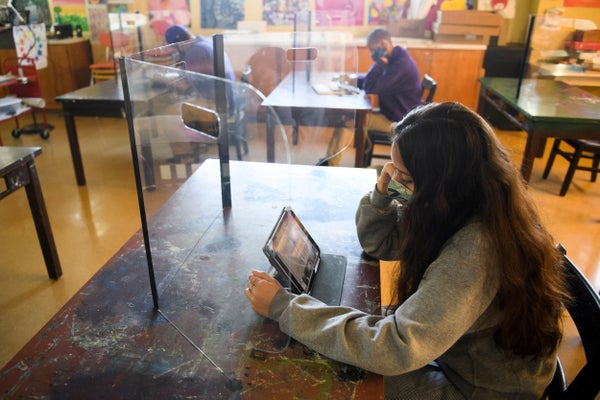Ask any teenager if they would like to talk about mindfulness and mood thermometers with their peers a dozen times in one school year, and most would decline the opportunity. But ask them instead if they would like a vaccine to ward off the worst mental health impacts of the past year and a half, and most would raise their hands without thinking.
Adolescence is a critical time for mental health, and most teens have an intimate relationship with stress. Before the pandemic, one out of every five U.S. teens developed a mental disorder, with half of all mental disorders occurring by age 14 and three quarters by the mid-20s. During the pandemic, approximately 40,000 children lost a parent, and many young people have been exposed to other traumas, such as food insecurity and homelessness, that increase risk for depression, anxiety and post-traumatic stress disorder. The pandemic will likely cause a spike in youth mental health problems, with long-term psychological fallout.
The good news is that, for youth, schools are an effective setting for preventing mental health problems. School-based interventions that enhance students’ capacity to regulate their emotions in healthy ways, such as reframing a problem positively, have proven effective at preventing or reducing mental health problems.
On supporting science journalism
If you're enjoying this article, consider supporting our award-winning journalism by subscribing. By purchasing a subscription you are helping to ensure the future of impactful stories about the discoveries and ideas shaping our world today.
Our research offers one example: our team delivered a 12-session group prevention program called RAP (Relax, be Aware and do a Personal rating) Club to eighth graders in 29 Baltimore City public schools. Most schools served marginalized communities where poverty limits family prospects and youth are exposed to high rates of violence and other trauma.
RAP Club included mindfulness practices, such as breathing breaks with a “mood thermometer,” to teach students nonjudgmental awareness of feelings and thoughts. Role-playing gave youth tools to promote positive communications. To demonstrate how pent-up stress affects the body, students shook up a bottle of seltzer until the liquid exploded; that was always a favorite.
Four months later, assessments with RAP Club students showed they had significantly fewer trauma symptoms than students who did not participate. And group discussions with RAP Club students highlighted other benefits. They talked about improved coping. “I been dealing with stress way better…. Way, way better,” said one boy.
Other students agreed. “When I get distressed... I used to smoke to get it off my mind. See now… I don't do it as much.” “When I'm angry—I don't just snap on everybody.”
Students saw changes in their sense of self. “I really used to have negative thoughts about myself, about the world…. Now I'm way more confident.”
And they described improved mental health: “Depression went away from me…I used to stay in my room a lot, listen to sad, depressing music, and just not talk to nobody. RAP Club… helped me—I dance more. I talk to my mother about everything now … we all happy and all that. Our life just changed.”
COVID then provided an unexpected opportunity for a natural experiment. We contacted and assessed a subset of approximately 150 trial participants during the pandemic, one to four years after they completed our programming. Youth who did not take part in RAP Club showed increased anxiety during the pandemic, which makes sense. We are in extraordinarily stressful times.
However, youth who participated in RAP Club, who learned how to manage the stress generated from the prepandemic hardships they faced, did not show a significant increase in anxiety. The program had provided a degree of immunization against this new batch of stress.
When this program began, we did not anticipate COVID-19 and the many ways it has disrupted childhood. As we dig deeper though, we start to see the potential of mental health interventions to protect against negative impacts of future trauma exposure.
As a new academic year approaches, most policy makers and educators will look to “check the box” and provide some sort of programming, or teacher training, that acknowledges the emotional damage the pandemic has inflicted. But these new findings show urgency for programming that goes much further.
Schools need resources to deliver evidence-based programs in an ongoing fashion to promote and protect student mental health. These programs need to be culturally and developmentally appropriate and delivered in a coordinated fashion across grades K-12. While all students should receive universal group programming, more intensive services should be offered to those needing additional support. Finally, program evaluation is critical to assess whether programs are effective and for whom they work best. Partnerships with universities can support data collection and analyses. Students’ and parents’ perspectives on what works must also shape solutions.
In coordination with student vaccination efforts, school leaders and policy makers should leverage the potential for school mental health programs to serve as “mental health vaccines.” As one of our focus group participants noted, “When you learn your feelings, you kind of find like inner peace. That happens, yeah.” We owe it to our nation’s youth to provide all the emotional protection we have available.
This is an opinion and analysis article; the views expressed by the author or authors are not necessarily those of Scientific American
